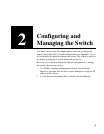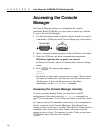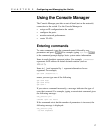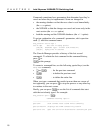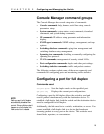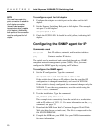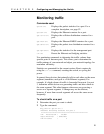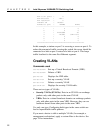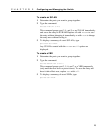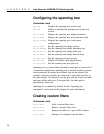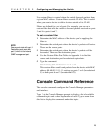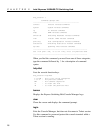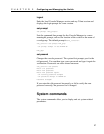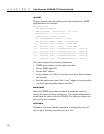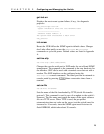
22
CHAPTER 2
Intel Express 100BASE-TX Switching Hub
Frm to all ports : 0
Frm multicast : 16017
Frm lost/fctrl : 0
Transmit OK : 1404387
Forward to port : FRAMES BYTES
-----------------------------------------------------
1 : 0 0
2 : 0 0
3 : 218103808 60
4 : 1419823 842711315
5 : 0 0
6 : 0 0
7 : 0 0
====================================================
In this example, a station on port 3 is accessing a server on port 4. To
reduce the amount of traffic crossing the switch, the server should be
connected to a hub on port 3 instead of a hub on port 4. This keeps
traffic localized to the same Fast Ethernet segment.
Creating VLANs
Commands used
set-vbc-domain
Sets up a Virtual Broadcast Domain (VBD).
del-vbc-domain
Deletes a VBD.
get-vbc-tbl
Displays the VBD table.
set-sec-vlan
Sets up a security VLAN.
del-sec-vlan
Deletes a security VLAN.
get-svlan-tbl
Displays the security VLAN table.
There are two types of VLANs:
• Security VLANs (SVLANs). Ports in an SVLAN can exchange
packets only with other ports in the same SVLAN.
• VBDs: Ports in a virtual broadcast domain can exchange packets
only with other ports in the same VBD. However, they can see
broadcast frames from other ports in the same VBD.
Use only one type. Configuring both types in the same switch can
lead to unpredictable traffic patterns.
If you want a device to talk to multiple VLANs (for example, a
management workstation), apply a custom filter to the device. See
page 24 for instructions.




